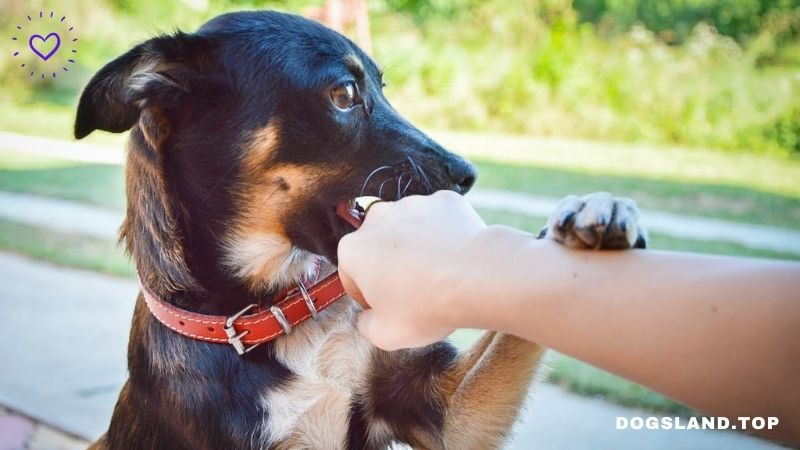5 Tips Stop the Biting Habit of Your Dog

A dog’s lovable features make them a great friend, but unfortunately, most dogs also exhibit unacceptable habits, such as biting, which may cause their owners a great deal of embarrassment. In this article, you’ll learn in these 5 simple tips on how to teach your puppy not to bite.
Dogs often resort to biting one another for a variety of reasons, including play, self-defense, and establishing dominance in the pack when they are upset by other animals or people.
Dogs may be able to inflict minor injuries on one other by biting because to their thick skin, but humans are vulnerable to bites due to our lack of protective fat and to the sharpness of their teeth.
Whether they’re trying to play, defend themselves, or assert their dominance in the household, it’s important that they know when and how to use their sharp teeth.
Your dog’s biting behavior has to be controlled so that he doesn’t become a danger to others. Dog bites are a major health concern and should always be treated by a doctor.
When to Start Dog Bite Prevention Training:
If your dog bites, it’s best to put an end to the habit while he’s still a puppy, ideally before he turns six months old.
Some owners of puppies excuse their pet’s biting behavior by saying it’s part of the normal course of play or that the puppy is teething, rather than seeing it as a severe behavioral issue that needs to be addressed.
Whatever the cause of your dog’s biting behavior, it is your responsibility as a dog owner to put an immediate end to it so that you may teach your pet the proper behaviors and establish yourself as the pack leader. Every dog should be educated early on not to bite, as it is a very harmful behavior.
Stop Your Dog’s Biting Habits:
1. Avoid rewarding your dog if he tries to mouth you
The vast majority of dog bite victims are bitten by family pets or friends’ dogs.
Biting is a common canine habit, but it may be prevented if you know how to stop your dog from behaving that way. Tell him it’s not okay for him to use his mouth or teeth to play with you or grab your attention.
2. Don’t hit or punish your dog
Using physical force on your dog might make him fearful and more likely to act aggressively. If you wish to prevent your dog from biting other people or objects, yelling at and striking him is not an effective form of punishment.
Instead, when he starts using his mouth or starts biting, stop playing with him, withdraw all attention, and take away all the things he enjoys most.
3. Maintain your dog’s good health
Be proactive about keeping your dog healthy by getting him or her vaccinated against distemper and rabies. Avoiding skin and other ailments requires that he be free of fleas and ticks. Maintain his good health with a balanced diet.
Your dog’s demeanour will change if his health declines. When a dog isn’t feeling well, it might get irritable and bite. Make sure your dog won’t use his illness as an excuse to bite if you wish to cease his biting behavior.
4. Educating your dog to engage with other canines (Socialization)
One of the greatest methods to teach your dog the right conduct and put an end to bad behaviors like biting is to introduce him to new people gradually. Due of their sociable nature, dogs should never be left at home alone.
An unsocialized dog is more likely to exhibit negative behaviors, such as aggression or danger.
If you live in an area where there are dog-specific playgroups or kindergarten programmes, your pup can get the socialization he needs with other dogs and people.
If your dog has a biting problem, you may assist him or her stop by exposing him or her to new social situations gradually. It’s important to gradually introduce your dog to new people and environments in a safe environment.
If you want your dog to be happy and healthy, you need to give it safe things to do so.
This will alleviate his discomfort from teething and teach him proper chewing habits. Also, this is a great way to keep your dog from becoming bored.
An increase in undesirable behavior is common in bored dogs. Keeping him active and engaged prevents him from becoming bored and developing negative behaviors such as biting. Keep your dog occupied to prevent him from returning to his biting ways.
5. Be consistent in training your dog to stop biting:
The key to successfully training your dog to behave is to be consistent with your instructions. Visitors to your home, including family and friends, should know that they are not permitted to ignore your dog’s tendency to bite.
Your dog will become confused if some members of the household playfully allow him to gnaw or bite while others do not.
In the event that he begins biting or chewing on unsuitable objects, instruct him to do so only on approved toys. If he bites down on the right things, be sure to tell him how great he is.
Conclusion
With our 5 tips, we hope that you have a better understanding of why your dog might be biting and how to stop the biting behavior without resorting to punishment.
Remember that all dogs are different, so it is important to take the time and effort necessary in order for them to learn what behaviors are acceptable or not.
With patience and consistency, you can help your pup understand which actions will be rewarded with love and attention from their owners – an invaluable lesson for any dog!
Read more here: 5 Dog Behavior Factors That Affect Dog Training at Home